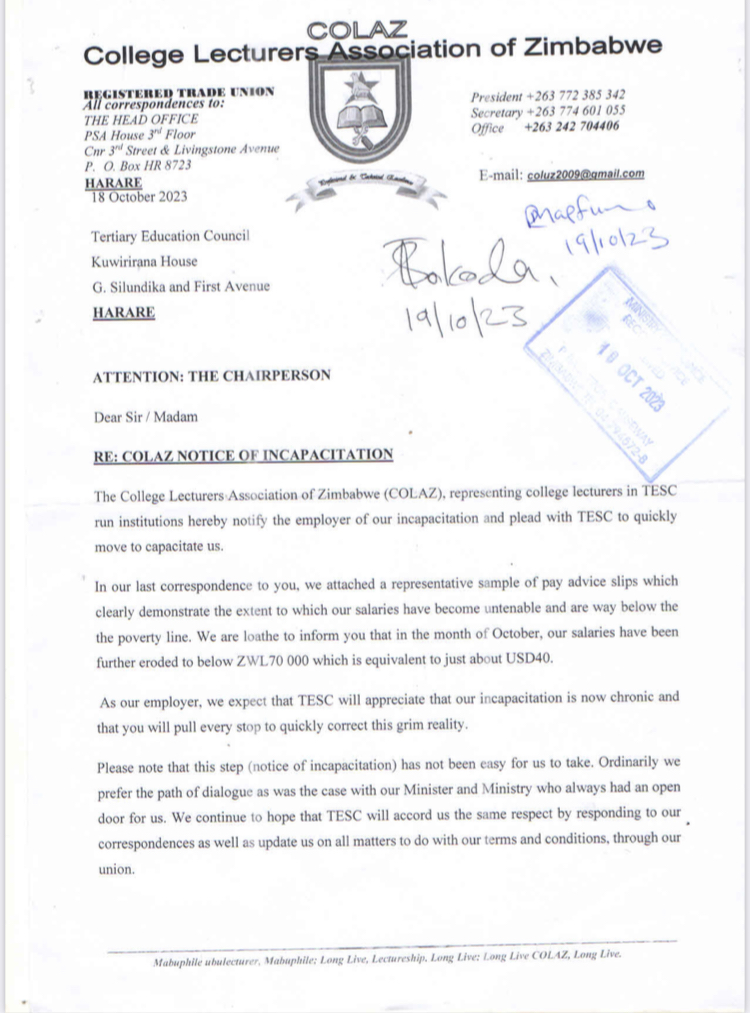The College Lecturers Association of Zimbabwe (COLAZ) has notified its employer, the Tertiary Education Service Council (TESC), that its members are unable to report for work as their monthly pay is now equivalent to only US$40.
The lecturers have given their employer two weeks to respond and if their requests are not met, they will down their tools.
College lecturers were taken from the purview of the Public Service Commission (PSC) and now fall under the authority of TESC, but educators complain the council is taking too long to resolve and implement their compensation concerns.
COLAZ President, David Dzatsunga, said lecturers are the prime movers of the Education 5.0 concept, which the government is pushing in tertiary institutions, noting that as educators, they need to be capacitated to effectively deliver.
“COLAZ hereby notify the employer of our incapacitation and plead with TESC to quickly move to capacitate us,” Dzatsunga said in a letter dated October 18, 2023 to TESC and copied to the Permanent Secretary in the Ministry of Higher and Tertiary Education, Innovation, Science and Technology and to the permanent secretary in the Ministry of Finance and Economic Development including all college principals.
The stamps and signatures on the COLAZ letter indicate it was delivered to the recipients.
“In our last correspondence to you, we attached a representative sample of pay advice slips which clearly demonstrate the extent to which our salaries have become untenable and are way below the poverty line,” said the COLAZ president.

Dzatsunga added, “We are loath to inform you that in the month of October, our salaries have been further eroded to below ZWL$70 000 which is equivalent to about US$40.”
Dzatsunga said lecturers expected that as their employer, TESC will appreciate that their incapacitation is “now chronic” and the council would “pull every stop to quickly correct this grim reality.”
“Please note that this step (notice of incapacitation) has not been easy for us to take,” said the COLAZ president who stated that ordinarily they preferred dialogue as had been the case with the Minister of Higher and Tertiary Education, Innovation, Science and Technology, which always opened the door for them.”
The COLAZ president said they hoped that TESC would accord lecturers the “same respect by responding to our correspondence as well as update to all of them concerning the terms and conditions, through the union.
“Finally we remain committed to rational disputation and wait for your action on the salary issue. We desire to enjoy the full benefit of migration and remain committed to play our part in driving the President’s vision of 2030,” Dzatsunga said.
“We are the prime movers of Education 5.0 and thus need to be capacitated to effectively deal with our duty to Zimbabwe.”
Some lecturers told CITE that they would give TESC two weeks to respond to their grievance.
“If the employer does not engage us meaningfully, we will down our tools. We are concerned that the council is dragging its feet in solving and implementing our salary concerns,” said one lecturer who spoke to CITE.
“The employer is quiet but we are giving them time to respond. Failure to respond, we don’t go to work because we cannot afford it.”

